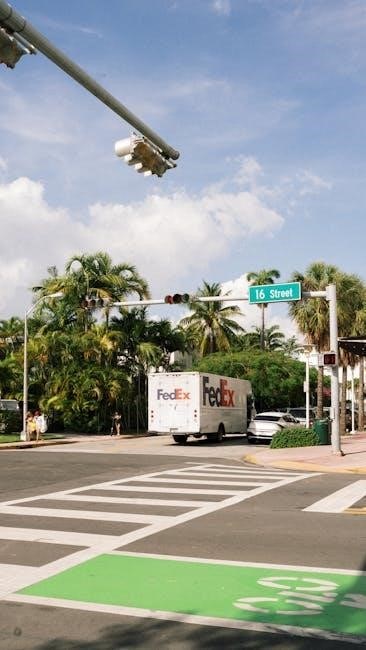Understanding Florida’s food truck regulations is crucial for compliance. Key requirements include state and local licenses, food safety certifications, and vehicle inspections. The Florida Department of Business and Professional Regulation (DBPR) oversees these standards to ensure public safety and fair business practices. Adhering to these rules helps food truck operators avoid penalties and maintain successful businesses in the Sunshine State.
Overview of the Food Truck Industry in Florida
Florida’s food truck industry has grown significantly, driven by diverse culinary offerings and the convenience of mobile dining. With over 1,000 licensed food trucks statewide, the sector thrives in urban and tourist areas. The industry supports local economies while offering unique flavors. However, it faces challenges like proximity restrictions to restaurants and varying local regulations. Despite these hurdles, food trucks remain popular, adapting to consumer demands and contributing to Florida’s vibrant food culture.
Importance of Adhering to Regulations
Adhering to Florida’s food truck regulations ensures compliance with health, safety, and operational standards. Proper licensing and permits prevent legal penalties and closures. Compliance also builds trust with customers, enhancing reputation. Meeting health codes and safety inspections protects public health and avoids potential liability. Additionally, following regulations fosters fair competition within the food truck industry, ensuring a level playing field for all operators. Compliance is essential for long-term business success and community safety.

Business Registration and Licensing
Registering your food truck business and obtaining proper licenses is essential. Secure an Employer Identification Number (EIN) and apply for state and local business licenses. Compliance ensures seamless operations.
Obtaining an Employer Identification Number (EIN)
An Employer Identification Number (EIN) is required for all food truck businesses in Florida. This unique identifier is issued by the IRS and is essential for tax purposes; To obtain an EIN, complete Form SS-4 on the IRS website or file by mail. The process is straightforward and ensures your business is legally recognized. Once received, the EIN must be used for all business-related financial transactions, including opening bank accounts and filing taxes. This step is foundational for compliance with state and federal regulations.
State and Local Business Licenses
In Florida, food truck operators must obtain both state and local business licenses to operate legally. The Florida Department of Business and Professional Regulation (DBPR) oversees state licensing, while local governments issue additional permits. A General Business License is typically required, along with a Mobile Food Vendor License. Local tax receipts and zoning approvals may also be necessary, depending on the county or city. Ensure all licenses are displayed prominently in the truck to avoid penalties. Compliance with these requirements is essential for smooth operations across jurisdictions.

Food Safety and Health Regulations
Florida mandates strict food safety standards for trucks, including regular inspections and food handler certifications. Adherence to state and local health codes is non-negotiable to ensure public safety.
Florida Food Safety Act and Its Implications
The Florida Food Safety Act ensures that all food establishments, including mobile vendors, maintain high sanitary standards. It requires food trucks to comply with strict health regulations, such as proper food storage, handling, and disposal. The Act also mandates regular inspections to verify adherence to safety protocols. Food handlers must undergo certified training to understand and implement safe food practices. Non-compliance can result in penalties or operational shutdowns. These regulations protect public health and ensure that food truck operations align with state and local safety guidelines, maintaining consumer trust and legal compliance.
Required Inspections and Plan Reviews
Food trucks in Florida must undergo mandatory inspections and plan reviews to ensure compliance with health and safety standards. New food trucks require a plan review by the Jacksonville Fire Prevention Office to verify equipment layout and safety features. Inspections cover fire suppression systems, handwashing facilities, and waste disposal. Permits must be displayed during inspections. Failure to meet standards can result in license denial or operational shutdowns. Regular inspections are conducted to maintain compliance, ensuring food trucks operate safely and meet all regulatory requirements. This process is crucial for public safety and legal operation.
Food Handler Training and Certification
Food handlers in Florida must complete state-approved training to ensure food safety. The Florida Department of Business and Professional Regulation (DBPR) mandates certification for all food truck staff. Training covers proper hygiene, food preparation, and safety protocols. Certificates are valid for three years, after which renewal is required. Supervisors or managers may need additional certifications. Non-compliance can lead to penalties or license suspension. These requirements ensure that food truck employees are equipped to maintain high standards of food safety and public health. Proper certification is essential for legal operation in Florida.

Permits and Certifications
Florida food trucks must obtain annual food permits and certifications from the Department of Business and Professional Regulation (DBPR). Special event permits are also required for temporary operations.
Annual Food Permit Requirements
To operate legally, Florida food trucks must secure an annual food permit from the Department of Business and Professional Regulation (DBPR). This permit ensures compliance with food safety standards and vehicle regulations. Applications must include detailed menus, food handling procedures, and proof of inspection. Renewal is required annually, with fees varying based on the type and size of the operation. Plan reviews and inspections are conducted to verify adherence to health and safety guidelines. Proper documentation and preparation are essential to avoid delays in the permitting process.
Special Event Permits for Food Trucks
Food trucks operating at special events in Florida must obtain a special event permit. These permits are typically issued for a specific duration and location, allowing trucks to serve at festivals, fairs, or other temporary gatherings. Requirements include submitting an application, proof of insurance, and a detailed menu. Some jurisdictions may limit the number of trucks per event or enforce specific health and safety protocols. Securing this permit ensures compliance with local regulations and enables food trucks to participate in lucrative events without legal issues.

Vehicle and Equipment Requirements
Food trucks in Florida must meet specific vehicle and equipment standards. This includes proper registration, inspections, and mandatory features like hand sinks and overhead protection to ensure safety and compliance.
Vehicle Registration and Inspection Standards
Food trucks in Florida must meet strict registration and inspection standards. Vehicles require proper registration with the Florida Department of Business and Professional Regulation (DBPR). Annual inspections ensure compliance with safety and health codes. Trucks must have a valid Vehicle Identification Number (VIN) and pass mechanical and equipment checks. Mobile food units are also required to display a “Mobile Food Dispenser” decal. These standards ensure public safety and operational efficiency, with failure to comply resulting in permit revocation. Regular maintenance and timely inspections are essential to avoid penalties and keep your food truck operational.
Mandatory Equipment for Food Trucks
Florida mandates specific equipment for food trucks to ensure safety and hygiene. A hand sink with hot and cold water is required for handwashing. Overhead protection, such as an umbrella or canopy, is necessary for shade and weather protection. Fire extinguishers and suppression systems must be installed and inspected annually. Proper ventilation systems are essential to prevent grease buildup and ensure air quality. Additionally, food trucks must carry a first aid kit and have adequate waste disposal containers. The Florida Department of Business and Professional Regulation (DBPR) enforces these standards to maintain public health and safety. Compliance is non-negotiable for operation.
Location and Operational Restrictions
Food trucks in Florida must adhere to proximity restrictions, avoiding operation near restaurants. Designated operating zones and special permits for events are often required to ensure compliance.

Proximity Restrictions to Restaurants
Florida food trucks face proximity restrictions, often banned from operating within 100 feet of restaurants. Local jurisdictions enforce these rules to balance competition and support existing businesses. While some cities strictly prohibit such proximity, others may allow it under specific conditions or with special permits. These restrictions aim to maintain fair business practices and prevent direct competition that could harm local eateries; Food truck operators must research local zoning laws and regulations to ensure compliance and avoid penalties. Understanding these restrictions is vital for successful operation in Florida.
Allowed Operating Areas and Zoning Laws
Florida food trucks must comply with local zoning laws, which vary by city and county. Generally, food trucks are permitted in commercial or industrial zones, while residential areas may require special permits. Some municipalities allow operation in public spaces or recreational areas, but restrictions often apply near schools, parks, or residential neighborhoods. Operators must research specific zoning regulations in their intended operating areas. Additionally, certain cities may require permits for special events or public spaces. Understanding these zoning laws ensures compliance and helps food truck businesses thrive in approved locations across Florida.
Tax Obligations
Florida food trucks must collect state sales tax and obtain local business tax receipts. Operators must register for tax accounts and comply with periodic filing requirements to avoid penalties. Additionally, they must display their tax receipts prominently as required by law. Adhering to these tax obligations ensures legal operation and supports local economies across Florida.
State Sales Tax Requirements
Food trucks in Florida must collect and remit state sales tax on all taxable food and beverage sales. The state sales tax rate is 6%, with local jurisdictions adding up to 1.5%. Operators must register for a sales tax permit with the Florida Department of Revenue and file periodic tax returns. Failure to comply may result in penalties, fines, or late fees. Proper record-keeping and timely payments are essential to avoid legal issues and ensure smooth operations.

Local Business Tax Receipts
Food truck operators in Florida must obtain a Local Business Tax Receipt, also known as an occupational license, to legally operate in each county or city where they conduct business. Requirements vary by jurisdiction, but receipts are typically issued annually and must be displayed prominently. This tax supports local services and infrastructure. Failure to obtain the necessary receipts can result in fines or penalties. Operators must research and comply with all local regulations to ensure uninterrupted operations across different regions.
Starting a food truck in Florida requires understanding various regulations. Key requirements include proper licensing, health inspections, and safety standards. Compliance with local, state, and health regulations is essential for a successful and lawful operation. Ensure all permits and certifications are up-to-date before launching your business.
Final Checklist for Starting a Food Truck in Florida
- Obtain an Employer Identification Number (EIN) for your business.
- Secure state and local business licenses, including a Mobile Food Dispensing Vehicle (MFDV) license.
- Complete food safety training and certification for all staff handling food.
- Pass required health inspections and plan reviews for your food truck.
- Ensure your vehicle meets all registration and inspection standards.
- Obtain special event permits if operating at festivals or temporary locations.
- Comply with zoning laws and proximity restrictions to restaurants.
- Pay state sales tax and obtain a local business tax receipt.
- Ensure all mandatory equipment is installed and functional.
- Acquire proper insurance coverage for your food truck and operations.
Resources for Further Guidance
For comprehensive details, refer to the Florida Department of Business and Professional Regulation (DBPR) website. Additionally, review the “Florida Restaurant Licenses & Food Truck Permits Guide” and the “Mobile Food Permit Requirements” document. These resources provide detailed insights into licensing, inspections, and operational standards; They also outline specific steps for compliance and offer contact information for further assistance.
